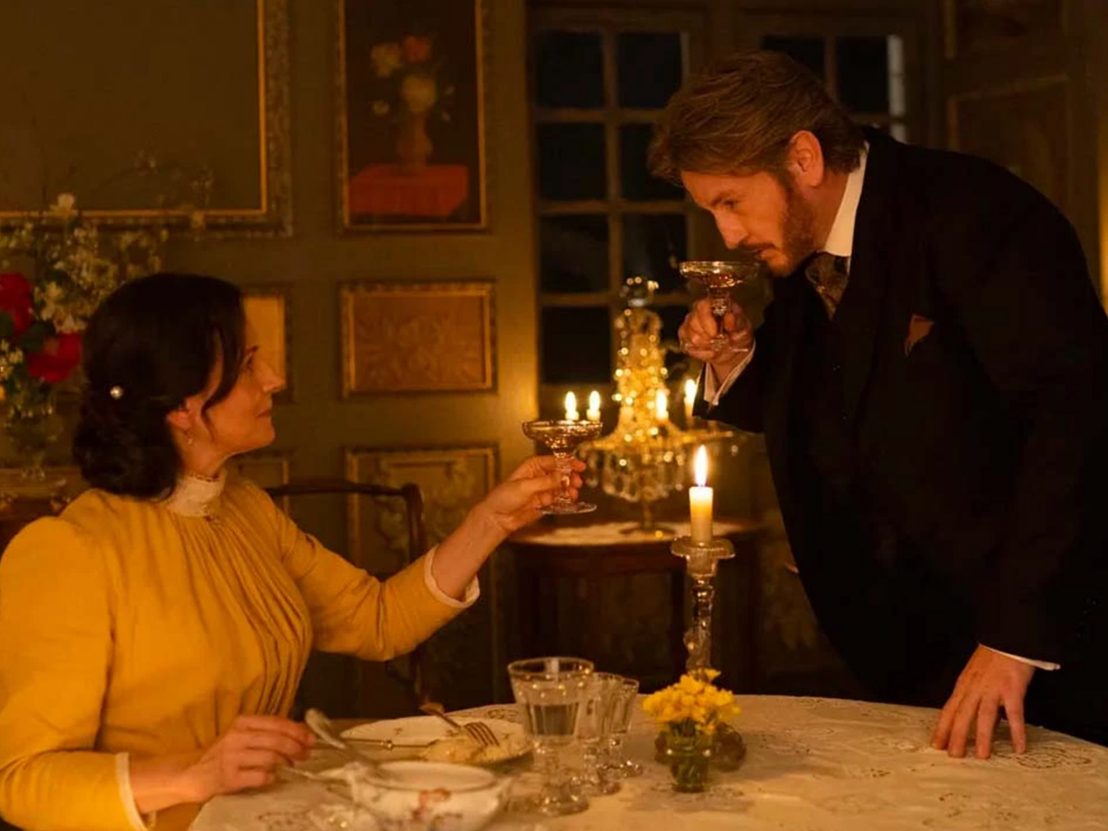
Juliette Binoche and Benoît Magimel play late 19th century gourmands in Tran Ahn Hung’s scintillating epic of proto-foodie passions.
It’s likely that none of us will have bestowed upon us the epithet, “The Napoleon of Something Something” within our lifetimes. Yet epicure extraordinaire, Dodin Bouffant (Benoît Magimel), has already earned the nickname, “The Napoleon of Gastronomy”, and with good cause. For he and his cook/lover Eugénie (Juliette Binoche) dedicate their dawns and dusks to fashioning meals and menus, all to be tested on a “suite” (Bouffant’s squad) of magnificently-waisted local gourmands.
We’re in an idyllic southern French countryside at the tail-end of the 19th Century during the pomp of revolutionary chef Auguste Escoffier. The industrial revolution has bore such fruits as ice-cream makers, turbot kettles, and all manner of kitchen gadgets for poking, scraping and slicing. One may swoon as Eugénie spreads ice-cream in the middle of two sponge cakes with a gorgeous-looking and oversized wooden paddle, clearly made specifically for the task.
And their gigantic range cooker comprises the centrepiece of their fully kitted-out kitchen, a place which retains its immaculate order due to the eternal diligence of housekeeper Violette (Galatea Bellugi). Also in the mix is young Pauline (Bonnie Chagneau-Ravoire), a gourmand-in-the-making who has the right stuff when it comes to palette and presentation, able to list the countless ingredients of one particularly rich sauce.
We have not seen Vietnamese filmmaker Tran Anh Hung on the scene since 2016’s very little-seen Eternity, and The Pot-Au-Feu is a very welcome call-back to the ultra-sensual films upon which he made his name, such as 1993’s The Scent of Green Papaya and 2000’s The Vertical Ray of Sun. Bouffant’s kitchen is bathed in a warm orange light that emulates the glow of hot embers, while Jonathan Ricquebourg’s camera floats around the domestic space with a lightness and curiosity that allows us to monitor even the most minor of cooking processes.
The foremost pleasure of The Pot-Au-Feu is the photography of the food itself, with Tran so dedicated to colour, texture and sound that you can virtually smell these sublime creations as they’re lifted from the stove. There’s an erotic pulse to shots of Bouffant hoisting preserved pears from a jar, or Eugénie pouring creamy béchamel into the world’s biggest vol-au-vent.
If there were a foodie film Olympics (and there isn’t as far as my knowledge goes, but maybe there should be), this one would stand in very good stead to duke it out with the likes of Babette’s Feast, Tampopo, Big Night and Still Walking. It’s like the antithesis of the current craze of fast-edited Tik-Tok recipe videos, as her you really get a sense of the time, effort and expertise that have been plunged into each dish.
Yet the food is merely the creative passion of Eugénie and Dodin, the former constantly refusing the latter’s hand in marriage so the personal/professional desire lines remain etched in the sand. There’s little-to-no conflict in the film, yet that doesn’t work against the fact that this is an extremely complex and nuance-based screen romance, complicated further by Eugénie’s minor health issues. Binoche and Magimel are both on sparkling form, as she appears in constant awe of the edible pleasures she is able to provide, while he sounds a corporeal symphony of grunts and snuffles while preparing food in a performance worthy of Depardieu in his pomp.
Even though the title comes from Dodin’s menu plan for a return visit from the Prince of Eurasia (a modest country stew to counter the prince’s boorish overindulgence), there’s little competition element to the film. We float through days and meals, ups and downs, celebrations and commiserations, as the story – with its fixation on the bounty of each season – becomes about inexorable ticking of the clock and the things we do to make our time on earth bearable. The film doesn’t strain for meaning or metaphor, instead just showing us the events over a certain period and allowing us to sample and chew over them as we would heaving plate of delicious food. Just a wonderful film.
Published 25 May 2023